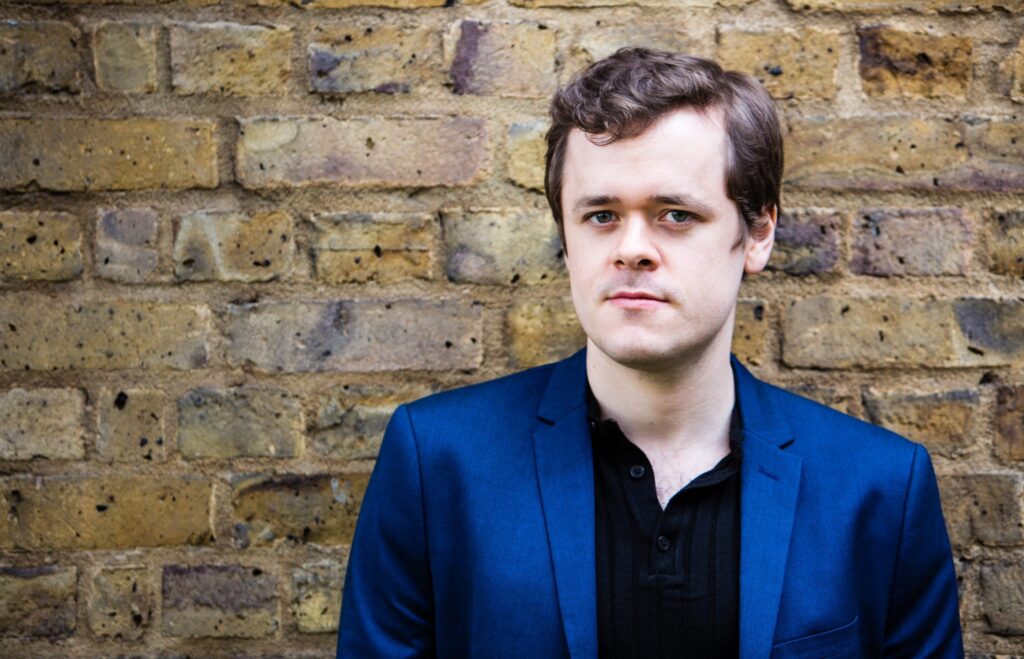Pianist Grosvenor overcomes distractions in thoughtful FOCM recital
Subdued virtuosity and tonal refinement pervaded Friday night’s recital by Benjamin Grosvenor, presented by Friends of Chamber Music of Miami at the FIU Wertheim Performing Arts Center.
The young British pianist chose to tackle four iconic works of the repertoire in this program. To start with Bach/Busoni’s Chaconne in D minor is in itself a bold statement. Grosvenor dove in straight away with a deliberate tone. He traced the magnificent arch of the piece with intelligence and abandonment, never neglecting to draw the listener in during the more introspective sections.
His technical command is undoubtedly first-rate. Yet what stood out most was his thoughtful phrasing and layering of gestures. Grosvenor displayed admirable control of the intricate textures. Particularly enticing was his use of the lower register to create an enveloping sound cloud, as though the music was coming from the organ pipes behind him.
Grosvenor was about halfway through the first movement of Schumann’s Fantasy in C major when a high-pitched frequency (perhaps coming from the spotlights) became unbearable. The pianist had to stop and ask for it to be fixed before resuming. Soon after, he restarted the movement.
The Fantasy is an emotionally consuming work, where it feels as though the composer was searching for something beyond our living world as well as beyond the instrument. It is this sense of yearning, of seeking this ideal that Grosvenor captured beautifully. The motives came through piercingly above the gurgling passagework with nuanced dynamics throughout.
The second movement is a processional, march-like statement. Grosvenor conveyed that robust element with an almost orchestral sound. This symphonic pianism continued in the softer and more playful moments too where distinct articulations “behaved” like instruments of an orchestra. At times, in the reverberant acoustics, his playing sounded overpedaled, but the effect was exciting. Grosvenor tackled the devilish coda with verve and apparent ease.
The third movement is a tribute to love: to Beethoven and to Clara, Schumann’s distant beloved at the time (1836). Grosvenor navigated the constant stream of arpeggios and the poignant melodies with a delicate touch, yet he did not shy away from the majestic buildups throughout the movement.
The second half featured Ravel’s Le tombeau de Couperin and Prokofiev’s Piano Sonata No. 7. Ravel’s homage to Baroque dances and forms was a pleasant tonal shift. Here the piano became Grosvenor’s playground, as he extracted interesting elements from all six movements. A charming, light “Prelude” was followed by a quirky, yet eloquent “Fugue.” A Northern Italian dance from the region of Friuli-Venezia Giulia, the “Forlane” has a distinct barcarolle-like bass enhanced by sudden harmonic shifts, yet Grosvenor did not over-indulge in these turns keeping the movement fresh and graceful.
He attacked “Rigaudon” with child-like directness, appropriate for Ravel’s re-interpretation of this lively dance. The “Menuet” was the most exquisite of the set as Grosvenor fully captured the two-bar inflection of this dance giving it a regal attitude, while the “Toccata” wrapped it up with an explosive ending.
Written in 1942, Prokofiev’s Op. 83 is the second of the three “War Sonatas,” all of which are musical architectures to behold. In the first movement, Allegro inquieto, Prokofiev elicits a dream-like sequence as we are snatched from frame to frame, tossed around these widely contrasting emotional states. Grosvenor played with visceral energy and restraint when needed, especially in the intertwining spacious moments. His voicing allowed for the menacing bass line to always come through clearly.
A touching opening statement of the second movement, Andante caloroso, grew gradually more desperate with insisting reiterations of the falling and rising inner melody. Grosvenor showed yet again his ability to traverse long phrases with admirable foresight. The final Precipitato was indeed that, a ceaseless moto perpetuo where one gesture chases the other, conveyed with determined energy by Grosvenor.
A standing ovation brought Grosvenor back for an encore, his own arrangement of Schumann’s Abendlied.
Friends of Chamber Music of Miami in collaboration with Piano Lovers, presents the second concert of the 2023 Rachmaninoff Series with Asiya Korepanova 8 p.m. March 14 at Coral Gables Congregational Church.
Stephen Hough performs 8 p.m. March 28 at the same venue. miamichambermusic.org
Posted in Performances
Leave a Comment
Sat Mar 11, 2023
at 12:17 pm
No Comments
